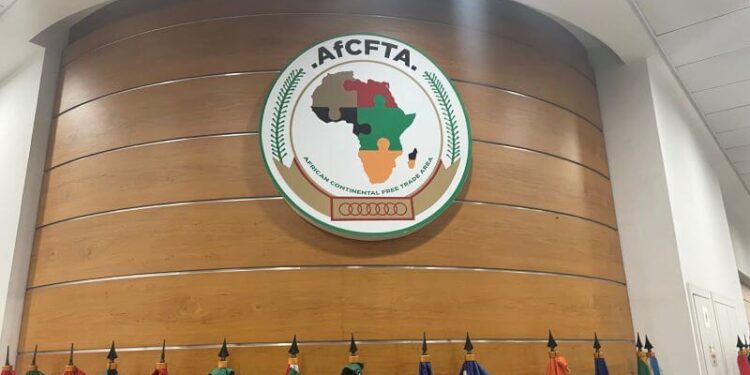Experts from academia, the private sector and development finance institutions have agreed that African countries must leverage the African Continental Free Trade Area (AfCFTA) and expand intra-continental trade to provide critical support for small and medium enterprises (SMEs) and drive the continent’s industrialization.
The plenary session, on Fostering African Industrialization Through Linkages of Small and Medium Enterprises to Global Value Chains, took place during the 18th Africa Economic Conference.
It brought together Prof. Banji Oyelaran-Oyeyinka, Senior Special Advisor to the President of the African Development Bank Group; Prof. Dirk Willem te Velde(link is external), Principal Research Fellow and Director of International Economic Development with the Overseas Development Institute (ODI); Ms. Aurelia Patrizia Calabrò, UNIDO’s Representative and Director of Regional Office Hub in Ethiopia and Special Representative to the African Union for United Nations Industrial Development Organization; Mr. Marcio Cruz, IFC Principal Economist, Economic and Market Research Department; and Engr. Yusuf Binji, Managing Director and Chief Executive Officer of BUA Cement Plc, Nigeria.
Mr. Jonathan Nzayikorera, African Development Bank Executive Director for Rwanda, Kenya, Eritrea, Ethiopia, Tanzania, Uganda, Seychelles, South Sudan and Somalia served as moderator.

He framed the conversation around a series of questions including: “How can African SMEs shift from exporting primary commodities to engaging in global manufacturing networks? What policy mechanisms can upgrade SME capabilities?”
Ms. Calabrò, used the example of SMEs in her native Italy. “Small is beautiful,” she said.
“Italy’s SMES are highly technologically developed and have created a lot of wealth.” She said SMEs needed to be organized and vertically integrated. UNIDO has been promoting cluster development for SMEs, she said, that rest on five cs: coordinate, compete, conform, connect, and credit.
Engr. Binji of BUA Cement said big enterprises depend on SMEs. He pointed out that five of every seven SMEs fail within one year. Solutions to this challenge must be indigenous and will depend on intra-African trade, he said. He emphasized that big firms, which receive considerably more financial support, should play a role in helping to nurture small enterprises.
“My own company benefited from a $500 million transaction this year from IFC, African Development Bank, AFC and DEG, but I believe there are also mechanisms in place to support a lot of the SMEs.” He urged small firms to work to standardize their offerings and improve quality controls.
IFC’s Marcio Cruz said that IFC, a part of the World Bank, typically supports the financial institutions that support credit to SMEs. He said, “We tried to understand the relationship between disruptive technologies, in fintech for example and access to funding toward these firms that are trying to provide new solutions.” Fintech firms are less likely to receive funding and the amount of funding they receive is relatively lower than has been seen in the Latin America and Caribbean region. IFC had set up a catalyst fund of more than $200 million to overcome this challenge by bringing in the private sector to address lack of access to credit, he said.
Prof. te Velde(link is external) said African companies do participate in global value chains but to a lesser extent than firms from other regions. This is due to a “lack of capacity to supply on time of the right quality, at the right time and at the right scale.” He said competitiveness remained a challenge, in part because productivity had not kept pace with gains in developed economies.
In terms of solutions, he proposed a combination of targeted policies and targeted finance. “I also would suggest that the African Continental Free Trade Area can help here to raise trade and competitiveness within the region. He stressed that the AfCFTA is more than a trade agreement. It will also strengthen linkages across Africa, he said, and reduce trade policy barriers. He pointed to African reserves of green energy and critical minerals as assets that Africa could tap to drive its industrial development.
Prof. Oyelaran-Oyeyinka of the African Development Bank said Africa had undergone only a partial structural transformation, linked to a lack of industrialization. “It is only within the low-income countries of Africa that you find agricultural contribution to GDP above 10%.” Middle income countries, he said, had flipped that figure to move from an agrarian society to an industrial society. Associated challenges included a lack of skills, lack of the right kinds of education and institutional support. Before addressing barriers to innovation, he said African countries should first address barriers to production.
He said SMEs would need to operate within an environment of horizontal integration, meaning an ecosystem in which small enterprises can source parts and inputs from their local environment so as not have to face such challenges as access to foreign exchange.
The three-day Africa Economic Conference opened in the Ethiopian capital, Addis Ababa, on Wednesday 15 November under the theme “Imperatives for Sustainable Industrial Development in Africa”.
Organised by the African Development Bank, the United Nations Economic Commission for Africa and the United Nations Development Programme, the 18th edition brought together experts, the private sector, researchers, and young people to discuss the challenges and prospects of industrialization in Africa.







